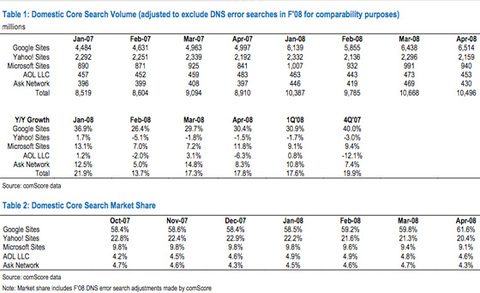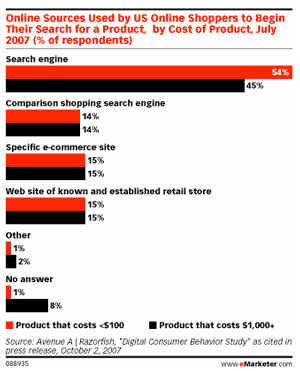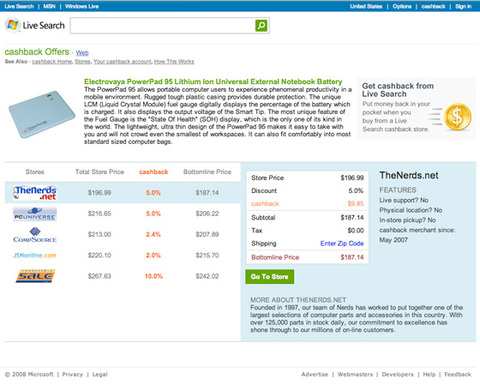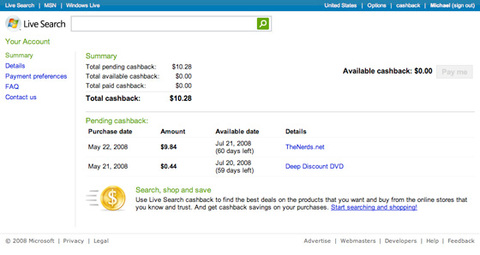The Empire Strikes Back: Microsoft Live Search Cashback
Everyone has an opinion on today’s move by Microsoft to shake things up in the search space with their new Live Search Cashback product that shifts search advertising from cost-per-click (CPC) to cost-per-action (CPA) and give a lot of the revenue back to users. Most are negative. Some excessively so. After hearing Bill Gates give the pitch and trying the service myself to make a couple of purchases, here’s what I think: It’s a bold move that goes for Google’s throat, and it will likely have a material impact on their search market share.
Our complete analysis is below. The key takeaway: Google’s search dominance is growing, and everything Microsoft has historically thrown at them has done nothing to slow them down. This new approach is both desperate and brilliant. Desperate because Microsoft is giving away most of the search revenue to get market share gains. Brilliant because they have such a small share of search revenue today that they have little to lose, and they are hitting Google hard in their core business.
The Numbers
Microsoft had to do something fairly drastic to get back in the search game. They’re third in U.S. search market share with under 9.1% of the total pie. Just six months ago they had 9.8% market share. Google, by contrast, has 61.6% and is growing steadily (click charts to enlarge):
Without search market share, Microsoft can’t get search revenue market share. And it isn’t just a matter of splitting up the pie. This is a winner-take-most market: Having 9% of search doesn’t mean Microsoft has 9% of search marketing dollars. Far from it - publishers go to Google to partner on ads, which means advertisers must go there to get inventory, and a very healthy auction system pushes up prices. So not only does Microsoft (and Yahoo, and everyone else) have much fewer queries than Google, they are also generating much less revenue per query as well.
So how much revenue are we talking about? Today the worldwide online advertising market is somewhere in the $40 billion range, and there are estimates that it will grow to $80 billion by 2010. The search piece of that is big - about 40%. So $16 billion or so today, growing to $33 billion by 2010. Google gets the vast majority of that search revenue today.
Microsoft’s core revenue is derived from Windows and Office, and the future doesn’t look to be very bright for desktop software sales. Google’s revenues, currently at $20 billion a year, could someday surpass Microsoft’s (Microsoft is currently at about $50 billion/year in revenue) if nothing is done to change the game.
Remember how everyone feared Microsoft’s dominance in the OS and Office worlds in the late nineties? That’s Google today in the search advertising space, a much bigger long term market.
It’s clear that technology alone will not unseat Google as the dominant player in this market. Microsoft already tried that with their AdCenter improvements in 2006; Yahoo tried with Panama last year. Google’s dominance only grew.
That means Microsoft has to do something different than just build new software that improves on the cost per click advertising model. And moving to a CPA model isn’t enough - Google and others are already experimenting with that. So instead, Microsoft is taking the CPA model, which lowers risk to advertisers, and combining it with a straightforward payback mechanism to users.
This only applies to ecommerce-related searches for now. But frankly that is all that matters. Only about a third of searches are commerce-related, but those searches generate 80% of search revenue. Get the commerce searches and you’ve got the revenue. And here’s another interesting statistic - 68% of online purchases begin at a search engine or shopping comparison site. Only about 30% are from direct navigation to the ecommerce site itself.
Will It Work?
Yes, it will work and it will almost certainly increase Microsoft’s market share in search, particularly in commerce search. The question is, how well will it work?
A year ago Microsoft basically did a trial run of Live Search CashBack with Live Search Club, which lured searchers to Microsoft with offered of prizes to users for using Live Search. Microsoft went from 10.3% to 13.2% market share in a month, a nearly 30% rise. Live Search CashBack, which gives a much more straightforward payout to users, should see significantly better results.
And really, what does Microsoft have to lose? They have a tiny piece of the revenue pie today, pay out money-losing revenue guarantees to partners like Digg and Facebook, and the online division itself is losing a cool $1 billion a year on about $2.4 billion in revenue. This new model isn’t going to give them a lot of profit, but it isn’t a money loser, either. Sometimes, desperation is a good place to be because it forces you to try crazy stuff.
The User Experience
I made two purchases today with Live Search Cashback. Microsoft presents results in a straightforward manner with the price of the item and the rebate clearly shown. After the purchases, the rebate appeared instantly in my CashBack account. No hiccups, great user experience. I came away with a totally different opinion from others.
Google v. Microsoft
The first thing I thought when I saw Live Search CashBack was that Microsoft is hitting Google where it hurts, in exactly the same way that Google is hitting Microsoft with their free online Office offerings. Google isn’t making much money on Docs, but it sure threatens Microsoft’s core revenue stronghold.
Similarly, Microsoft isn’t likely to make much profit on Live Search Cashback, since they are giving most of the money back to users. But it hits Google in its sweet spot - commerce search. And it may have a bigger impact and a faster impact on Google than people realize. Docs is a still a future revenue threat to Microsoft;Live Search Cashback is taking money out of Google’s pockets today.
The question, as I said above, is how much money they’re taking out of Google’s pockets. That’s yet to be seen. But Microsoft also made it clear that this is just a first step in the search war, and things are guaranteed to get a lot uglier in the near future.






Nenhum comentário:
Postar um comentário